Oklahoma governor stops execution, commuting death sentence of Tremane Wood
Wood will now spend life in prison following Gov. Stitt's clemency. Also: SCOTUS allows Florida execution to go ahead. And: Full SNAP benefits are funded. For now.
On Thursday morning, Republican Oklahoma Gov. Kevin Stitt commuted Tremane Wood’s death sentence on the day the state was preparing to kill him.
“After a thorough review of the facts and prayerful consideration, I have chosen to accept the Pardon and Parole Board’s recommendation to commute Tremane Wood’s sentence to life without parole,” Stitt announced in a statement. The board had recommended clemency on a 3-2 vote on November 5.
Stitt noted that the life sentence was “the same punishment [Wood’s] brother received” for the murder of 19-year-old Ronnie Wipf in 2002. Wood had maintained that he had participated in the underlying robbery but denied killing Wipf. At the same time, as Wood’s lawyers pressed, his brother, Zjaiton Wood, had admitted to the murder before dying in 2019.
Stitt said that his clemency decision “ensures a severe punishment” for Tremane Wood “that keeps a violent offender off the streets forever.”
Addressing the “murder of an innocent young man,” Stitt concluded, “In Oklahoma, we will continue to hold accountable those who commit violent crimes, delivering justice, safeguarding our communities, and respecting the rule of law. I pray for the family of Ronnie Wipf and for the surviving victim, Arnie; they are models of Christian forgiveness and love.”
It was the second time Stitt had commuted a death sentence in his time as governor, previously having commuted Julius Jones’s death sentence in November 2021.
The clemency announcement came shortly after the U.S. Supreme Court had rejected Wood’s request for a stay of execution. Only Justice Ketanji Brown Jackson announced that she would have granted Wood a stay of execution.
It was the second rejection from the Supreme Court of a request for a stay of execution in the past 24 hours.
In opposing Jennings’s execution, the Catholic Mobilizing Network highlighted two aspects of Thursday’s scheduled execution:
At the time of his crime, Bryan was a 20-year-old US Marine. He has spent 45 years on Florida’s death row.
Bryan was left for years without state-appointed counsel, a violation of state law guaranteeing representation for death-sentenced individuals. Bryan had no legal representation when his death warrant was signed, and ultimately received newly appointed counsel days later, a matter of weeks before his scheduled execution.
If Florida proceeds with Jennings’s execution, as noted, it will be the state’s 16th execution this year and the 42nd in the nation in 2025.
The last state to carry out more than 15 executions in a year was Texas in 2013. It carried out 16 executions that year.
[Update, 9:00 p.m.: Florida killed Bryan Jennings. (More at Tracking Florida’s Death Penalty.)]
Full SNAP benefits funded
The good news: All eligible people should be quickly getting their full SNAP benefit payments for November.
With the shutdown-ending appropriations legislation signed into law, the Justice Department informed the U.S. Supreme Court that it was withdrawing its request for a stay of the district court order that U.S. Department of Agriculture (USDA) pay out full Supplemental Nutrition Assistance Program (SNAP) benefits for November.
As Solicitor General John Sauer wrote:
This was almost certainly the hope that the Supreme Court had when the full court issued a further administrative stay in the request earlier this week. Now, with the request withdrawn, Chief Justice John Roberts and his fellow Republican appointee colleagues are spared from needing to choose between denying food for children in the weeks before Thanksgiving or siding against President Donald Trump.
DOJ also told lower courts of the news — and of the newest USDA memo — which is worth a look.
First, the memo from Patrick Penn, the Deputy Under Secretary for Food, Nutrition, and Consumer Services at USDA, unambiguously states that “[f]ull … federal funding is now available” to pay out the food-program benefits, “including for November 2025 benefits and expenses.”
Then, at the end of the opening, Penn states that USDA “shall not pursue any additional penalties against state agencies” — citing the same provision previously highlighted in the November 8 letter that threatened such penalties. This is blocked by the existing temporary restraining order issued by U.S. District Judge Indira Talwani. As such, this language is likely going to be used by DOJ to argue that no permanent relief is needed for states that issued full benefits last week and might be concerned the Trump administration is later going to try and retaliate against them.
Specifically, as to the November benefits, USDA lays out that full benefits should be paid out “promptly.”
Additionally, due to “November’s implementation challenges,” states will not be penalized for timeliness issues regarding “application processing or recertification.“
Finally, Penn highlights that the contingency fund will not be “sufficient to provide full” benefits should there be a “lapse of appropriations” again next year. (The Agriculture Department is funded for the year under the appropriations bill, so SNAP benefits will not be at issue when the next funding deadline hits at the end of January.)
Rather than discuss how he will be working to make sure USDA can fund these required payments regardless of government dysfunction, Penn instead “strongly encourage[s]” states “to begin the process“ of getting their state systems ready for “reduced allotments in the event that available appropriations are insufficient to provide full allotments in any month.“
So, Penn remains ready to try and reduce benefits again next fall if the federal government can’t fund itself.
“Be prepared for anything because we have no clue if we are going to keep this ship afloat” is where we’re at.



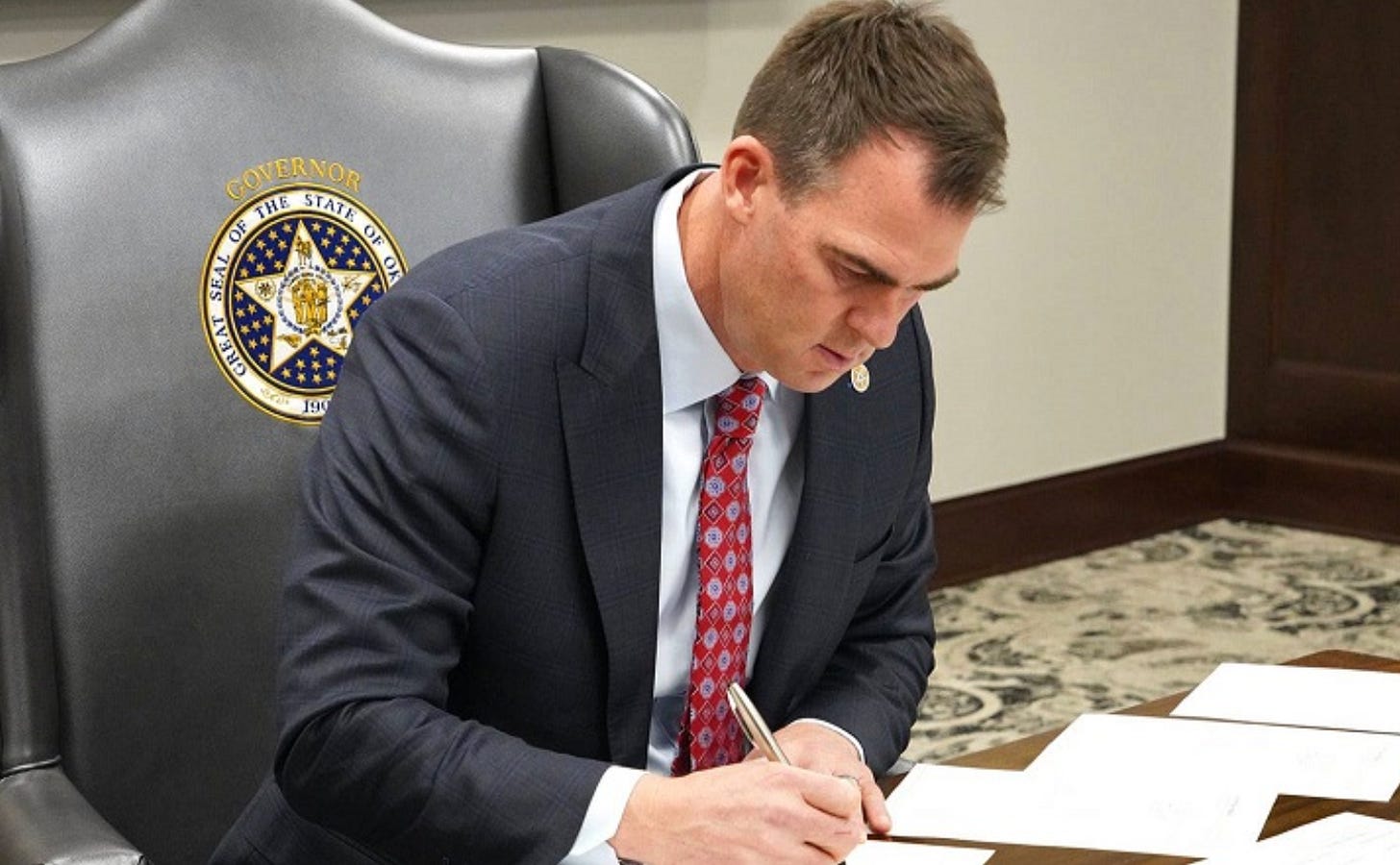
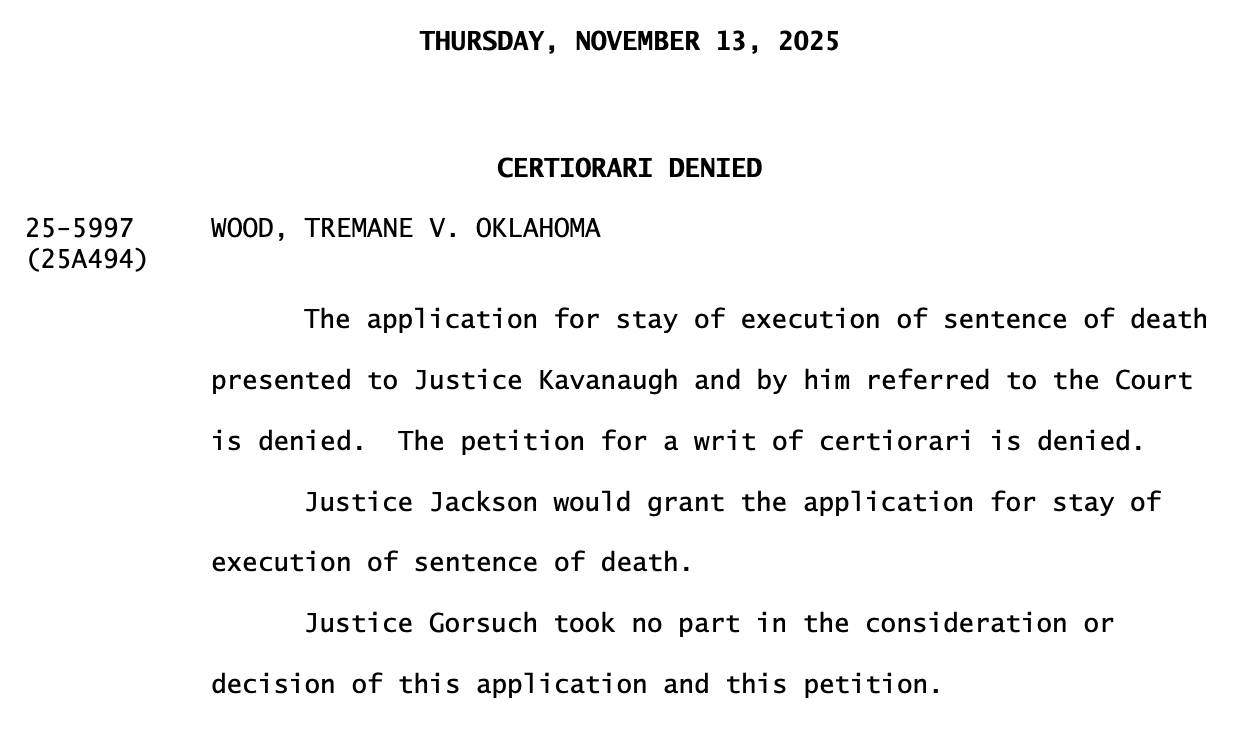
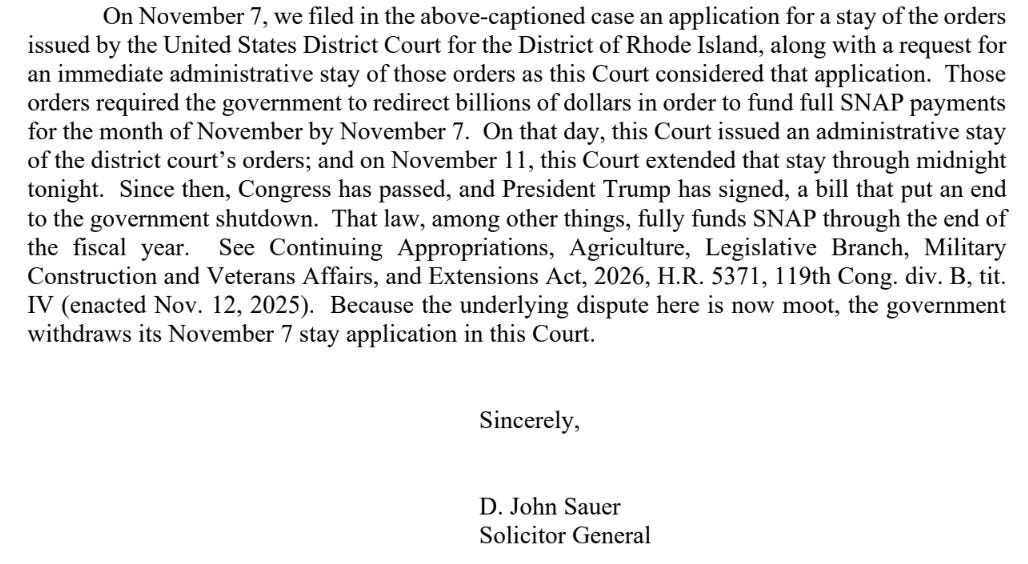
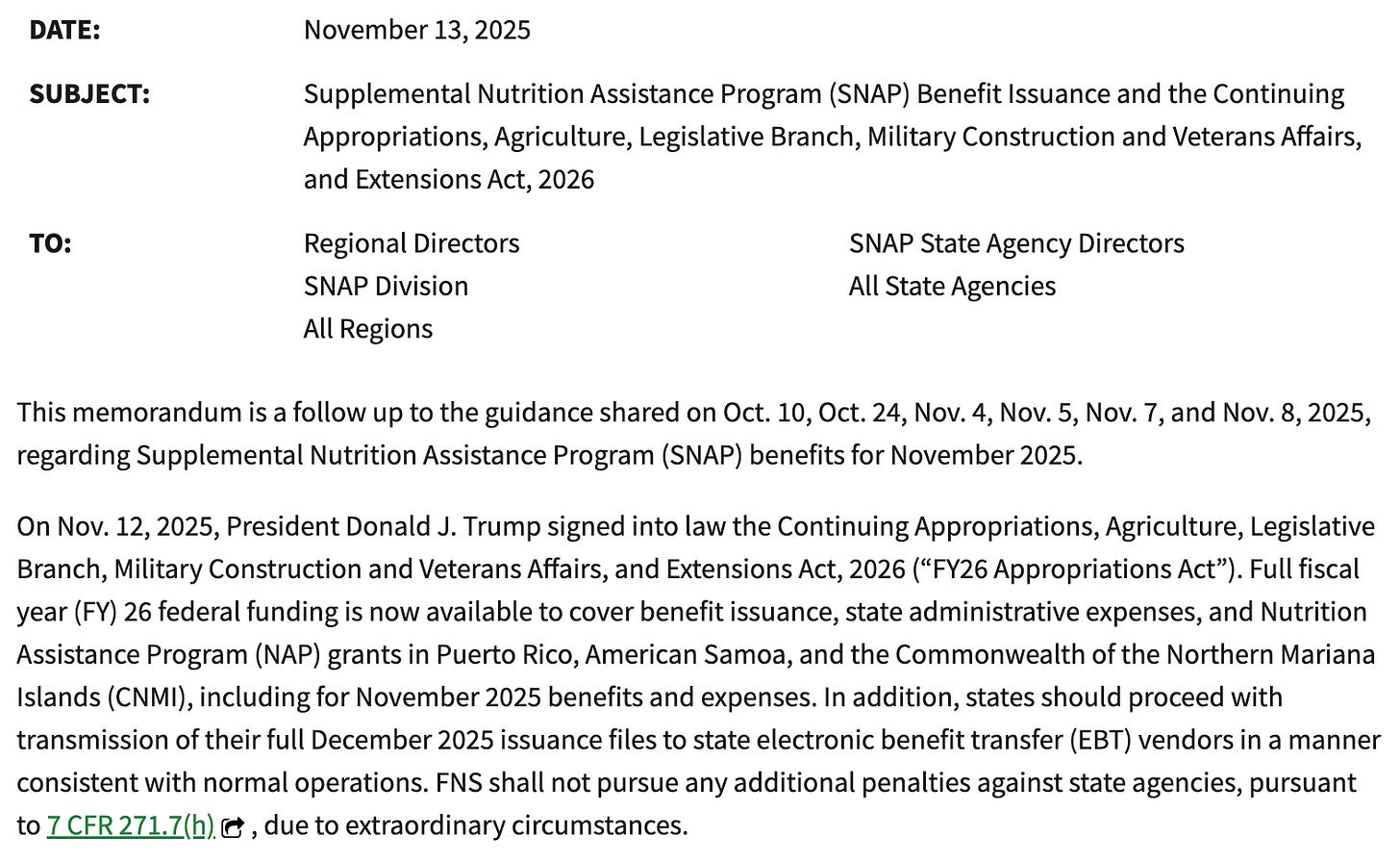


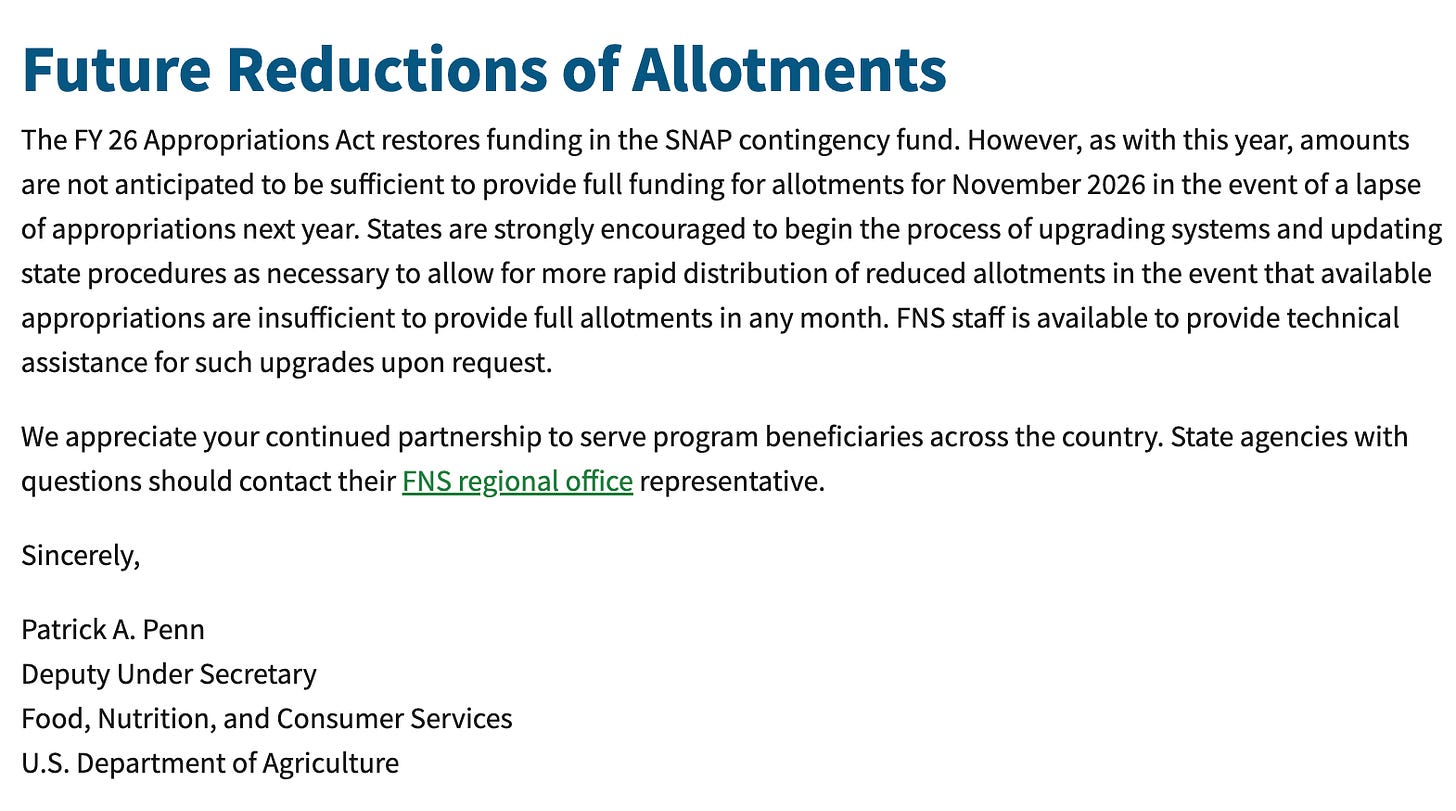
Oh the horror! Roberts and Republicans on SCOTUS would have had to choose between denying food to children and ruling against El Trompo? What a wrenching dilemma for those erudite yet sycophantic souls: a decision would take that most Americans under 2 seconds to decide. They were spared! All's well that ends well...except in January 2026, here come those ongoing reductions in the pittance SNAP grudgingly gives hungry Americans. Poverty is still a crime, and must be duly punished...
Thank you, Chris, for explaining some of the subtle details of this saga.
Thankfully, I am resisting all puns - and finger gestures - on the latest SNAP news.